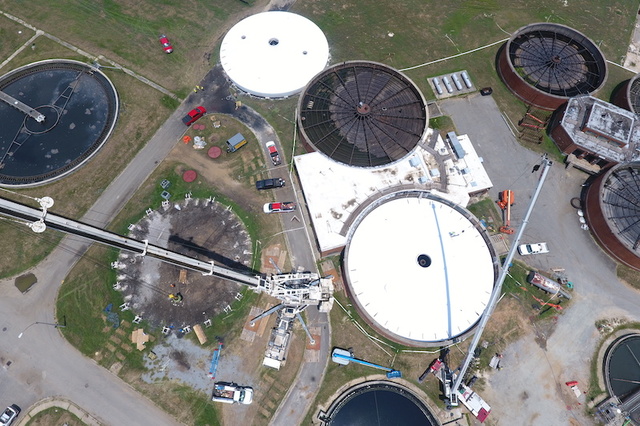How Is Wastewater Treated?
Wastewater Treatment, Water Treatment
Wastewater Treatment Plants, such as the MWA’s Lower Poplar and Rocky Creek facilities, apply several steps to recycle wastewater.
Wastewater treatment plants also are referred to as water reclamation facilities (WRF), since the wastewater is “reclaimed” for beneficial reuse and directly or indirectly returned to raw water storage facilities like reservoirs, lakes, rivers, and streams.
Solid byproducts of the wastewater treatment process are handled according to strict environmental regulatory oversight, provided by the EPA on the federal level and by the state EPD in Georgia.

The Five Steps to Wastewater Treatment
The five steps of the wastewater treatment or water reclamation process include:
- Preliminary treatment
- Primary treatment
- Secondary treatment
- Tertiary or advanced treatment
- Disinfection
Source: Water Environment Federation
1 Preliminary Treatment
The first stage of wastewater treatment is preliminary treatment, where solids are removed from the influent, or wastewater that enters the treatment plant, with the use of screens, grit chambers, etc. Without removal, solids would clog pipes and disable treatment plant pumps down the line during the treatment process.
2 Primary Treatment
Primary treatment involves a more sophisticated settling tank, also called a sedimentation tank or clarifier, which operates to remove most of the solids that will float or settle.
3 Secondary Treatment
Secondary treatment features a highly controlled artificial environment where microscopic organisms feed on the waste that is still present in the wastewater. These organisms biologically convert these dissolved solids into suspended solids that can then physically settle out.
4 Tertiary or Advanced Treatment
Tertiary or advanced treatment improves the quality of the water even more, in some cases removing specific toxic substances, but in most cases removing suspended solids and nutrients. In addition to nutrient removal, advanced treatment may utilize some form of filtration to achieve a higher level of suspended solids removal than is possible through primary and secondary screening and sedimentation.
5 Disinfection
Disinfection is the final step or stage of the wastewater treatment process before water is released back into the environment. Disinfection significantly reduces any remaining bacteria and viruses, and it helps protect the public from exposure to potentially pathogenic micro-organisms.
Solids Processing
The processing and handling of solids is also a necessary component of the wastewater treatment process. Untreated solids are often referred to as sludge, while treated solids are referenced as biosolids.
The first steps in handling solids involve conditioning and thickening since they are typically only about 3 to 6 percent solid (a concentration that is predominantly water).
Next, stabilization processes are used to further treat the sludge by reducing odors and pathogen levels. This makes the product beneficial for use or disposable without posing a hazard to the environment.
The last step in handling solids is dewatering, which is typically achieved through mechanical means.
Macon Soils is an MWA subsidiary that handles and disposes of treated biosolids that are the result of the wastewater treatment processes at the Lower Poplar and Rocky Creek Water Reclamation Facilities (wastewater plants).
